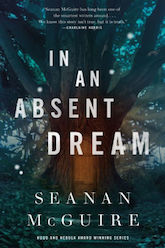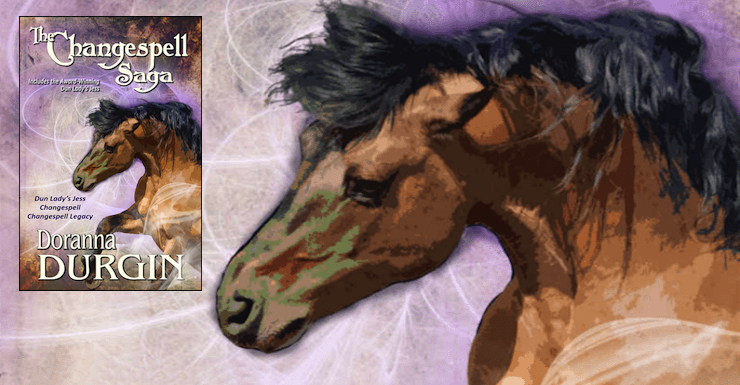Whenever writers ask me how to do horses right, I refer them to Doranna Durgin’s Dun Lady’s Jess. It’s not only that it’s written by a lifelong horse person, or that it’s a kickass fantasy in its own right, or that it’s a nice shiny award winner. There’s nothing else quite like it.
There’s plenty of nice chewy genre stuff going on in the book. It’s a portal fantasy with parallel worlds. There are wizard wars and breakneck chases and nasty politics. There’s interesting worldbuilding: a world in which magic takes the place of technology, with spells for everything from cooking food to healing broken bones to waging war. The good guys have complex lives and motivations, and the bad guys are not evil Just Because. They have reasons, mostly having to do with money and power.
But when it all comes down to it, I’m there for the horses. One horse in particular, the dun mare of the title.
Horse books in general tend to focus on humans interacting with horses. Loving them, using them, having adventures with them. When horses are the viewpoint characters, they’re still primarily reflections of human wants and needs and psychology. Sometimes overwhelmingly so, as I noted in rereading The Heavenly Horse from the Outermost West.
In Dun Lady’s Jess, Durgin gives us a real horse, as real as human observation can make her—and then, through the side effect of an untested magical spell, transforms her into a human woman.
This, more than the travel between worlds and the battle between wizards and the modern American humans trying to cope with the reality of magic, is the heart of the book. There’s plenty of fantasy-adventure, plenty of human action and plot-stuff, but it always, comes back to the horse named Lady, who is also the woman called Jess.
Lady was born in the stables of the wizard Arlen; she was bred to carry Arlen’s couriers, riders who carry messages from wizard to wizard. Arlen has discovered a spell that allows travel between worlds. It’s inevitable that someone will find a way to misuse any spell, from the least to the most powerful; therefore the wizards have developed a system of what they call checkspells—spells that serve as a brake on each particular use of magic. They’re designed to prevent abuse, but there’s always a period between the invention of the spell and the installation of its checkspell, when a rogue magic user can work the spell without consequences.
Arlen’s new spell has enormous implications not only for his world but for any world it touches—some of which may not know or recognize magic. These would be wide open to invasion. Therefore he’s doing his best to keep the spell secret, only sharing it with wizards he can trust to help him with the checkspell, including his neighbor, Sherra.
There’s a rogue wizard in the mix, named Calandre, and it’s crucial she not get hold of the spell before the checkspell is in place. She’s been starting to make trouble, and Arlen’s couriers have been disappearing, which is ominous.
Arlen sends Jess’ rider, Carey, on a mission to Sherra, carrying the only written copy of the spell, and also carrying a spellstone that, when activated, opens the portal to another world. It only works once, and there’s a return spell, which is also a one-off.
Carey is intercepted by Calandre’s riders before he reaches Sherra, and in the melee, Carey triggers the portal spell. It sweeps up not only Carey and his mare but one of Calandre’s agents, along with his mount.
When they all come to, instead of two men and two horses, all four are in human form. We don’t realize this for a while however; the only one we see at first is Lady. She’s alone with all her gear including the saddlebag that contains the copy of the spell, and she is profoundly shocked and confused.
So are the modern Ohioans who find her, Dayna and her friend Eric. Dayna adamantly refuses to believe in magic and seriously can’t cope with the fact that all evidence points to the strange, naked, nearly inarticulate woman being not only from another world but of another species. Eric and Dayna end up taking the woman, whom they decide to call Jess—Dun Lady’s Jess isn’t a people-name, and Lady certainly is not—to Dayna’s friend Jaime, who runs a high-end dressage facility and lives with her non-horsey brother Mark.
Jess is fixated on finding Carey. In the meantime she learns about clothes (which she initially calls “blankets”) and learns to read, and begins to understand not just humans but the culture of the world she finds herself in. She even, eventually, learns to ride a horse—which arouses weird and complex emotions.
She’s doing far better than the enemy’s horse. He never adjusts to life as a human. On his way to court to be handed over to an institution, he breaks loose and runs into traffic. Jess witnesses his death.
Carey does eventually turn up, as the captive of Calandre’s agent, Derrick. Derrick wants the spell, and he’s holding Carey’s spellstone hostage, which is the only way any of them will get home. Jess and her new friends rescue Carey and drive Derrick off, and Carey joins Jaime’s household.
It’s an odd, strained situation for everyone. Carey immediately recognizes Jess, whom he persists in calling Lady. He treats her like a horse, which does not sit well with Jaime at all, because that includes acting as if she’s still basically his possession—his working animal, whom he sincerely respects and for whom he feels deep affection, but she’s not on a level with the human woman she now is.
Eventually Derrick finds Carey again, and everything comes to a head. Jess, in a rage at what Derrick did to Carey, shoots and kills him. She has no remorse. He’s a bad man. He hurt Carey. He deserves to die.
Carey gets his stone back and transports everyone including Derrick’s body and Jaime’s truck to his own world. There, the wizard war is heating up—and Jess is Lady again, the dun mare whose mind nearly snaps as she tries to process the shift back from human to horse.
Carey is in bad shape by the time they win through to Sherra. Eric is dead, Dayna has discovered to her horror that she is a powerful and completely untrained wizard, and Lady has gone off the edge. A healer who does not know the full story shuts off the Jess part of her, which more or less sedates her, but shocks and saddens both Carey and Jaime.
There is still a bit of Jess left, and it gradually reemerges, until near the end, when Lady severely injures her foreleg while helping to rescue Arlen from Calandre’s prison. Dayna turns her back into Jess, knowing that a woman with an injured wrist is far more functional than a horse with a blown knee. Jess helps to save Arlen and defeat Calandre, then asks Arlen to give her a spell that will allow her to change back into Lady whenever she decides she can’t live as a human any longer. She doesn’t know that what he gives her is a placebo. There’s no actual spell.
She and Carey by then are in love, though they’re not doing anything much about it. Jaime and Dayna and Mark are able at last to go home. The checkspell is in place, Calandre is contained, and all’s as well as it can be.
Lady and Jess are amazing, distinct, but closely related characters. The transformation of the horse into the woman, mentally as well as physically, is a complex process, and parts of it are harrowing for both identities. Jess keeps most of Lady’s instincts and mannerisms—when severely provoked, for example, she kicks to wound, and she will bolt when frightened—but she also has to grow into some basic differences. Though their other senses are notably less acute, humans see colors that horses don’t (though since 1994 when the novel was published, it’s been demonstrated that they have blue-yellow vision). Their thought processes are different, more complicated, especially when it comes to sexual feelings. Horses are straightforward, direct; as flight animals, they’re more inclined to run than to think, and they’re capable of extreme and narrow focus, particularly when in motion. They’re also much, much more observant of body language and nonverbal signals.
Jess has a lot to process. She doesn’t think like a human, but the longer she lives as one, the less like a horse she becomes. When she’s forced back into her equine body and brain, she’s thrown into shock. The greater strength and stamina, the keener senses, are more than welcome, but the reduced mental processing power frustrates her to the point of breaking. Horses have extremely good memories, which means she can remember everything about her life as Jess, but much of it escapes her understanding.
Buy the Book


In An Absent Dream
I don’t think anyone has ever written a book like this. Durgin has studied horses closely and understands them on a deep level. She writes them as horses, as close as any human can come, and she leaves her human biases and assumptions out of it. What she does by transforming Lady into Jess is illustrate brilliantly how horses and humans differ, while giving us a character who is a near-perfect fusion of both.
The only footnote I would add is more relevant to later books in the trilogy, but it’s mentioned here. Durgin implies that mares only cycle once a year, in the spring. Mares in fact go into estrus monthly from spring into fall, and some cycle year-round. Jess doesn’t cycle during the weeks she’s in Ohio, or after she returns home, but in reality she’d have had multiple cycles.
But that’s the one asterisk I’d put on the book’s knowledge of horses. Otherwise it’s brilliant and deeply thought out and spot on. It’s full of pricelss details: the workings of a competitive dressage barn in the Nineties, the behavior of horses singly and together, finer points of riding and training and horse care that are incorporated seamlessly into the narrative. Lady/Jess herself is a wonderful character, one of the best in horse literature—and certainly one of the most accurate.
Judith Tarr is a lifelong horse person. She supports her habit by writing works of fantasy and science fiction as well as historical novels, many of which have been published as ebooks by Book View Cafe. She’s even written a primer for writers who want to write about horses: Writing Horses: The Fine Art of Getting It Right. Her most recent novel, Dragons in the Earth, features a herd of magical horses, and her space opera, Forgotten Suns, features both terrestrial horses and an alien horselike species (and space whales!). She lives near Tucson, Arizona with a herd of Lipizzans, a clowder of cats, and a blue-eyed dog.










